Many European-Americans tend to treat the U.S. Civil War as a sort of travelling, endless hobby we all share, divided into interest groups such as documents, weapons, music,battle reenactments, photographs, and maps.
Other white people express a poignant, sort of haunted nostalgia re. the war, which is really a deceptively sentimental rumble of anger, even a threat. I think these represent two of several major themes that function to erase the meaning of this war from our national memory.
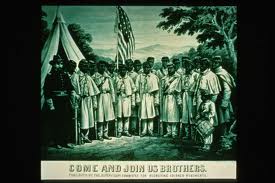 The American Civil War didn’t create the deep wound that spreads throughout our national psyche and shapes so much of our national life.
The American Civil War didn’t create the deep wound that spreads throughout our national psyche and shapes so much of our national life.
Slavery did.
We haven’t been able to heal that wound, not because we’re all haunted by mixed feelings about the war itself – try to find one African-American who’s ever felt the slightest sense of loss or twinge of bittersweet ambivalence, for example – but because we haven’t finished dealing with slavery.
In fact, contemporary evidence of America’s unfinished business with slavery is so massive as to have assumed the shape of normalcy for many. But under that increasingly frayed surface, we all know better.
And precisely because they do know better, precisely because they can’t stomach the human cost any longer, white Americans should resist the lure of a cultural tradition that prevents us all from coming to terms with the real meaning of this war.
The American Civil War was a fight to the death over slavery, and everyone knew it – especially the slaves.
This wasn’t a war Americans figured out as they went along. They’d been engaged in furious, passionate conflict over it for half a century, and they didn’t keep that a secret. Major religious denominations separated, new organizations continually sprang up, violence broke out on the floor of Congress, people hatched plots, smuggled escaped slaves to freedom, renounced their families, wrote books, started newspapers, and sent speakers to troll the globe for international support.
In Kansas, people slaughtered one another by the dozens, and entire towns were burned to the ground. A small inter-racial band of men took over a federal armory in Virginia, tried to incite a national slave rebellion, and were shot or hung.
The United States was the only country in the world that hadn’t abolished slavery. You could come to America, buy a human being, and do whatever you wanted to do to that person – and if she was a woman, you could will all of her children, grandchildren, and great-grandchildren to your own family.
Your family could own their family – forever!
Their wasn’t anything banal or ordinary about it. It was intimate all right: Intimate and brutal. American slavery was maintained only through extreme violence, which includes the ever-present threat of violence.
And yet .. America was also supposed to be “the city on the hill”. A light for all the nations, one that proclaimed itself the repository of the truth, insisting that all men were created equal and given rights – including liberty – by God himself.
This contradiction wasn’t lost on anyone – including American slaves. They were well-informed about the political climate, discussed it constantly, and prepared to position themselves to make a move when the time came.
They didn’t just wait to be freed.
Well before the Union had penetrated the South, its military relied on well-established communication networks developed by slaves. Slaves served as invaluable guides and smugglers. They escaped from their owners and volunteered to return to slavery as spies, saboteurs, and assassins. They monitored Union troop movements like hawks, and entire plantations of slaves disappeared overnight, reappearing a week later behind Union lines.
. Northern officers quickly learned to rely upon slave knowledge of the terrain, of food sources, Confederate troop movements, celestial navigation, plant medicine, and hunting. Some slaves were highly skilled, trained as carpenters, cabinet makers, masons, tailors, blacksmiths, grooms, and chefs.
Slave labor, skilled and unskilled, was a critical, key asset to the Union.
But their greatest desire was to enlist in the Union army and fight for their own freedom. They wanted to prove themselves, yes. But they also wanted to make sure the North won.
Many historians mark the Union decision to enlist former slaves as the turning point of the war, for they swelled the Union ranks as the Confederacy ‘s numbers dropped. Often sent into the most dangerous situations, these newly freed soldiers fought with courage and fierce determination.
Put the slaves front and center, rather than trotting them out from the wings periodically, and restore them to the center of the story.
That’s where they belong
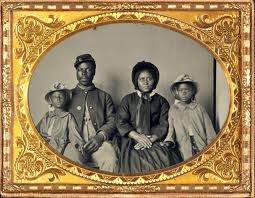
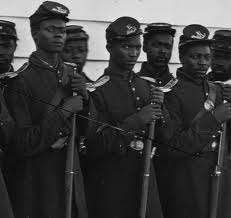
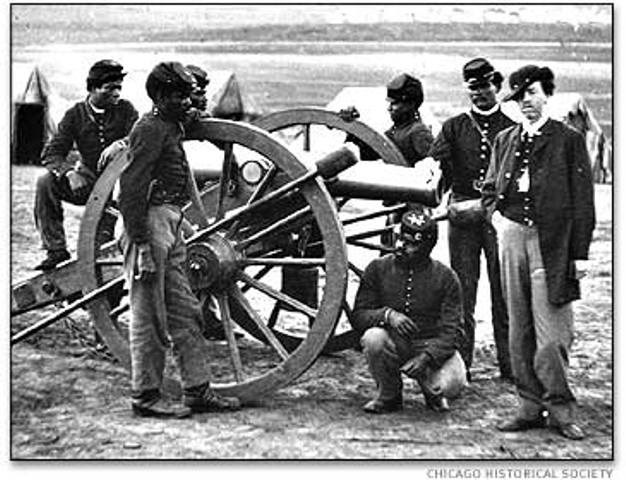
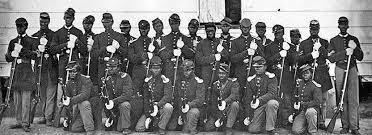
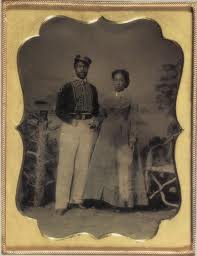
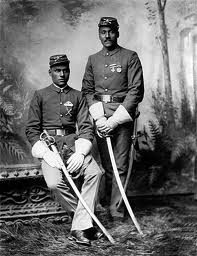
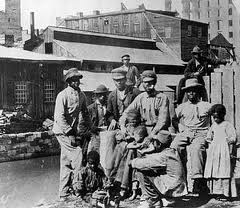
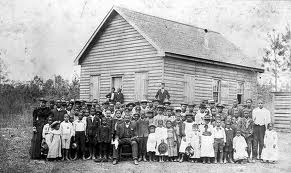

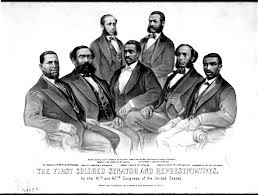
Touching and truly intense. Claire. In this millennium forces conspire to make enslaved commodities out of all of us. Awareness, will and clarity are lacking at a time when they are hugely important. Our PM has just hired a redneck racist from Australia who is an expert in divide and conquer politics to revive a vicious, moribund campaign that ends on October 19. This post of yours reminds me of the intelligence, sacrifice and strength needed if Canada is to escape abject colony status. Thanks.
LikeLiked by 1 person
You are a good comrade, a good reader, and a good friend, mytiturk. Thank-YOU for your insight and courage. I’m sorry I can’t say the same for myself, but I have been having a truly hard time. Please accept appologies and know that I will visit soon.
LikeLiked by 1 person
Dear Claire, I hope you are alright.. something tells me you are up against it …be well, go well, love V
LikeLiked by 1 person
Claire: this article is especially relevant in the aftermath of Ferguson, suggesting as you do that American racial prejudice never really went away, it just subsided momentarily. It’s a good reminder that just because America can have an Oprah and an Obama doesn’t mean it has achieved spiritual release on this critical matter.
LikeLiked by 1 person
Sean, thanks very much. Your opinion means a lot to me. You are a brother across the border.
LikeLike
Good piece, Claire. Are you OK?
LikeLike
Thanks very much, Derrick.
I’m not so good right now. Thanks for asking! I’ll be on touch soon, though.
LikeLiked by 1 person
I wondered. I wish you well.
LikeLiked by 1 person
(-:
LikeLiked by 1 person
Reblogged this on Eléctrica in the Desert.
LikeLike
Reblogged this on Dogma and Geopolitics.
LikeLike
Aw, shucks, Angela. Thank-YOU. The honor is mine.
You know, I think I was at your blog writing a comment while you were at mine.(Sorry,I practically wrote a novel) I just now saw this and haven’t read your other comment yet.
Thanks again!
Claire
LikeLike
LOL
LikeLike
Thank you Claire for stopping by my blog. I appreciate the honor. -Cheers, Angela
LikeLike
Claire, that was a great post. You pointed out many unknown facts about the role slaves played in the war. I agree there is unfinished business particularly when the topic generates great discomfort.
It is hard to imagine that life was worse in the South for many “freed” slaves after the Civil War.
LikeLike
Angela, Thanks very much for taking the time to come by and read my work – I appreciate it! I should have specified that by “unfinished business”, I was refering to the mass exodus of white alies when the door of opportunity slammed shut for millions of poor African-Americans – less than a decade after the gains of the Civil Rights Movement. That huge generation of white Americans that stood back and did nothing for over three decades is STILL standing around, doing nothing and playing dumb.
LikeLike
Hi Claire,
Many still want to believe , “We are equal. There are no differences.” Or are they delusional? How do you make people understand without sounding like a whiner and or an abuser of the “race” card? Angela
LikeLike
Bascially, there’s no such thing as “the race card” – not until some future that has NOT arrived when “the card” can be played to REAL systemic advantage. Until then, such a “card” is a construct, made up by whites to make African-American professionals feel guilty when they are trying to make a point about the MAJORITY of Black people. By personalizing it to that one professional, or group of professionals, whites try to deny the larger social context.
Makes you long for the days when the Black Panther Party for Freedom and Justice marched into a situation and told whites to shut up and do the right thing, without expressing their tender feelings – white feelings had ceased to be the point. Action and changed policies were the point.
But we all know what happened to them.
LikeLike
Oh, you old soldiers are always looking for a chance to salute! 🙂
Seriously, I don’t think anyone’s ever said that to me before. Thank-you, Valerie.
Claire
P.S. If you do not absolutely love the short and sweet “Having our Say” by the Delaney sisters (they were, like 100 years old when the book came out..10 or 12 years ago..I THINK), I promise I’ll learn how to separate an egg.
Sigh…I knew I’d have to buy a bowl someday….(:
LikeLike
Wonderful piece Claire, I agree with and Feel every word you have written.The Civil War, the people who fought in it and the issue of slavery is one of my passions.
It bothers me that Gone With the Wind has obliterated the story of Uncle Tom’s Cabin, I read somewhere that it was the South’s final victory. It enrages me to read what happened to Jefferson’s slave family, and to all his other slaves who found themselves being marketed to pay his debts…it really hurts to read what happened to so many of the slave families who attached themselves to the different Union armies, and to read the accounts of slavery in the records compiled by students during the Depression from surviving slaves.
I salute you and your work, and hugely admire your writing.
LikeLike
A very informative and historically accurate post on the stain that slavery has left on the American conscience. I don’t remember learning much of this in my history textbooks. Then again, the winners tend to get the most prominence with a few captions for the sore losers.
LikeLike
Thanks, Jeff. Considering how carefully researched and documented your own work is, I feel highly complimented.
The most telling aspect of your point is that African-American WERE on the winning side! In a manner of speaking. But with allies like white Americans, who needs enemies? The new citizens had only 13 years of protection before federal troops withdrew, unleashing a wave of white terrorism.
And southern Back people didn’t vote again for 87 years.
Anyway, hope all is well. And thanks a lot for coming by.
I’m off to check out what you’ve been up to.
LikeLike
I learn more from your comments than I do from some people’s whole articles. I’m curious to hear your thoughts on two recent posts I did about Chavez and farmworkers justice. Take care.
LikeLike